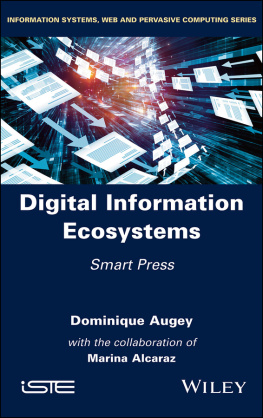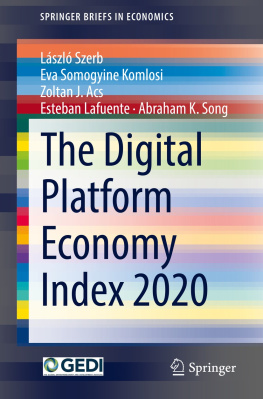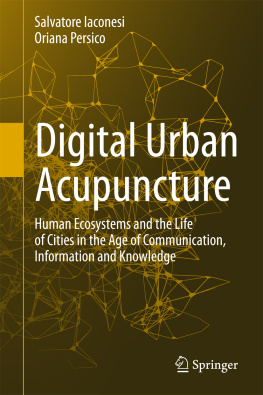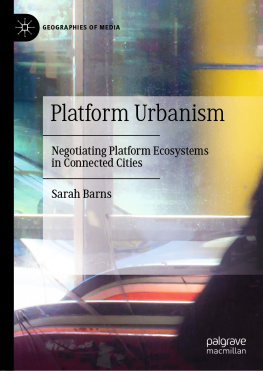Alcaraz Marina - Digital information ecosystems: smart press
Here you can read online Alcaraz Marina - Digital information ecosystems: smart press full text of the book (entire story) in english for free. Download pdf and epub, get meaning, cover and reviews about this ebook. City: London;UK, year: 2019, publisher: John Wiley & Sons, Incorporated;ISTE Ltd, genre: Politics. Description of the work, (preface) as well as reviews are available. Best literature library LitArk.com created for fans of good reading and offers a wide selection of genres:
Romance novel
Science fiction
Adventure
Detective
Science
History
Home and family
Prose
Art
Politics
Computer
Non-fiction
Religion
Business
Children
Humor
Choose a favorite category and find really read worthwhile books. Enjoy immersion in the world of imagination, feel the emotions of the characters or learn something new for yourself, make an fascinating discovery.
- Book:Digital information ecosystems: smart press
- Author:
- Publisher:John Wiley & Sons, Incorporated;ISTE Ltd
- Genre:
- Year:2019
- City:London;UK
- Rating:3 / 5
- Favourites:Add to favourites
- Your mark:
- 60
- 1
- 2
- 3
- 4
- 5
Digital information ecosystems: smart press: summary, description and annotation
We offer to read an annotation, description, summary or preface (depends on what the author of the book "Digital information ecosystems: smart press" wrote himself). If you haven't found the necessary information about the book — write in the comments, we will try to find it.
Digital information ecosystems: smart press — read online for free the complete book (whole text) full work
Below is the text of the book, divided by pages. System saving the place of the last page read, allows you to conveniently read the book "Digital information ecosystems: smart press" online for free, without having to search again every time where you left off. Put a bookmark, and you can go to the page where you finished reading at any time.
Font size:
Interval:
Bookmark:

Series Editor
Jean-Charles Pomerol
Dominique Augey
with the collaboration of
Marina Alcaraz

First published 2019 in Great Britain and the United States by ISTE Ltd and John Wiley & Sons, Inc.
Apart from any fair dealing for the purposes of research or private study, or criticism or review, as permitted under the Copyright, Designs and Patents Act 1988, this publication may only be reproduced, stored or transmitted, in any form or by any means, with the prior permission in writing of the publishers, or in the case of reprographic reproduction in accordance with the terms and licenses issued by the CLA. Enquiries concerning reproduction outside these terms should be sent to the publishers at the undermentioned address:
ISTE Ltd
2737 St Georges Road
London SW19 4EU
UK
www.iste.co.uk
John Wiley & Sons, Inc.
111 River Street
Hoboken, NJ 07030
USA
www.wiley.com
ISTE Ltd 2019
The rights of Dominique Augey and Marina Alcaraz to be identified as the authors of this work have been asserted by them in accordance with the Copyright, Designs and Patents Act 1988.
Library of Congress Control Number: 2018964892
British Library Cataloguing-in-Publication Data
A CIP record for this book is available from the British Library
ISBN 978-1-78630-414-8
The interest in this book is apparent for two reasons. It provides a rich and comprehensive account of all the challenges that digital technologies have put forward and continue to put forward to news media and journalists. To do this, the two authors use recent statistical data from multiple studies, but above all, they offer an overview of multiple academic works, mostly in English, by economists and social science researchers on these issues. Every reader will therefore learn a lot by reading this book because the works presented are often little or not at all known, given that in France, for example, the academic analysis of the news media is only marginally based on economic theories. It is a real asset of this book that it presents dozens of publications on media economics and related theoretical analyses, such as the application of game theory and public choice or the study of biases in order to understand the functioning of the media and journalists.
Illuminated by its conceptual contributions, the book thus paints an uncompromising portrait of the current weaknesses of the press in fulfilling its essential democratic mission. All the major issues of the moment are covered, from the destruction of jobs as a result of digitization and the double decline in readers and advertising revenues, to the capture of these revenues by the two giants Google and Facebook, the dangers of poisonous fake news, as well as the links between political power and the press, or the uncertain future created by the introduction of computer-assisted journalism and the weight of algorithms in selecting the information that comes to us.
Based on this book and our own work, we would like to put three major issues facing the press into perspective, ones that briefly outline some key ideas to be retained.
The digitization of the world has an impact on all sectors of activity. It destabilizes acquired situations, and it forces us to rethink economic models and adapt the workforce by promoting new skills. Journalism was affected very quickly, because the Internet opened the doors to competition with new information producers, whether amateur or semi-professional, and because the citizens desire to be informed in real time took off as soon as this technology allowed it. The book rightly highlights how difficult it has been for the press to find its bearings in the face of such a reality. There has often been a lack of support for change in editorial offices. The culture of free access on which the Internet has flourished has been an insurmountable challenge for many news media. The notoriety of press brands and the associated financial resources mean that major inequalities in digital adaptation can be seen between the media that have managed to cross the line and are consequently rather profitable, and the others that are still persisting, or even taking a hit in the hope of avoiding ruin.
However, our deep conviction is that this change in the journalistic paradigm is not, as in any revolutionary phase, the transition from a stabilized X state to a stabilized Y state, via a period of turmoil that is linked to the changes to be implemented. No. The digitization of the world is a movement to accelerate technological progress, which means that the new paradigm that is emerging is in fact a paradigm of permanent change. The revolution of web first (publishing first online and thinking about the content of ones traditional media in relation to this temporality) is behind us, and we must already master the revolution of the mobile first (publishing first for smartphones), while waiting to discover novelties that engineers are creating in their laboratories and soon in their factories. Incidentally, it is regrettable that the Mojo aspect (mobile journalism) is not heavily touched upon in this book.
This revolution for the press is therefore not only an economic challenge, presented in this book from every perspective, but also in the strong sense, it is a cultural challenge. What intellectual and managerial gymnastics must press companies implement in order to become permanently adaptable? The future of media companies is undoubtedly on the side of setting up R&D structures, with research and development becoming a necessity in order to be at the forefront of transformations, rather than being subjected to them in a defensive position, on the back foot. The future also lies in supporting the spirit of initiative and innovation of the employees of these companies, from the editorial staff to the IT development or marketing departments.
The second question we wanted to highlight is that of GAFA. The role of platforms in the information universe is a curious mix of positive aspects and much more negative realities. The positive aspect is undoubtedly the multiplication of meeting points with the journalistic information that they represent. More and more people say they have access to news through these digital social networks, and the phenomenon is even diversifying, since Apple News is now becoming a major provider of traffic for news sites, and since WhatsApp and Snapchat bring new ways to get informed by reaching new, often younger audiences, via its Discover device. However, the other side of the coin is that some of the players in this globalized access market have managed to build up oligopolistic positions. Google and Facebook, for example, capture most of the advertising value, as Marina Alcaraz and Dominique Augey have clearly shown.
Moreover, these players have established themselves thanks to the power of their algorithms, algorithms that become real prescribers of our information choices without us always being aware of them. This is a real democratic challenge. Can we still trust Google to select the information deemed most relevant to our requests? Should we trust Facebook when they prioritize the information posts that come up on our wall, without telling us how? In the name of a legitimate economic interest, these companies refuse to make their algorithms public, since their financial success directly depends on it. However, as soon as these algorithms influence our choices of information, and therefore the functioning of democracy, it is equally legitimate to ask for the transparency of algorithms. Here, the competition of legitimacies is head-on. The interest of companies (secrecy) diverges completely from the interest of citizens (transparency). One thing is certain, we must establish a balance of power with these content providers (since,
Next pageFont size:
Interval:
Bookmark:
Similar books «Digital information ecosystems: smart press»
Look at similar books to Digital information ecosystems: smart press. We have selected literature similar in name and meaning in the hope of providing readers with more options to find new, interesting, not yet read works.
Discussion, reviews of the book Digital information ecosystems: smart press and just readers' own opinions. Leave your comments, write what you think about the work, its meaning or the main characters. Specify what exactly you liked and what you didn't like, and why you think so.











